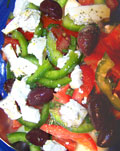April 2009
Salad Season
As the snow recedes, the idea of salad becomes very appealing. To celebrate the season, we’ve assembled a list of easy salads, from classic Greek to trendy.
Elaioladon-Contis Imports’ extra virgin olive oils are a prime ingredient in all of them. Feel free to experiment with adding more or less olive oil than suggested. The Malabar Pepper Company’s fresh ground pepper is the perfect final touch for the last two salads.
Classic Greek Salad
- 2-3 medium-sized tomatoes, chopped into large chunks
- 1 medium cucumber, sliced into medium-sized half-moons
- ¼ onion, cut into thin strips (preferably pre-soaked in cold water and strained)
- ¼ green pepper, cut into thin strips
- a chunk of Feta cheese (optional)
- a pinch of oregano
- ¼ cup extra-virgin olive oil
- 12 salty black olives, preferably of the Kalamata variety
- salt to taste
Cut the tomatoes and cucumber into a large bowl. Add onion, green pepper and cheese. Rub the oregano between palms to maximize flavor, then add olive oil, olives and salt.
In a variation of the salad, either tomatoes or cucumbers can be omitted. If you have juicy tomatoes, you can also convert the Classic Greek Salad into a Cretan “Dakos” Salad. Just add two big bread rusks (dried bread) and 2 more tomatoes. Start by soaking the rusks at the bottom of the bowl in the fresh tomatoes and their juice.
Click on the links below to see more salad recipes:
Mixed Salad with Grapefruit, Avocado and Pine Nuts
Indispensable Pepper
Would you sprinkle sawdust over your delicious meal? That’s more or less what people do when they ignore the quality of their pepper, says Ranjan Nambiar of The Malabar Pepper Company.
In most pepper, the flavor and aroma has been lost. “You might as well use sawdust, as all the flavor has escaped in pre-ground pepper,” notes Nambiar. By contrast, The Malabar Pepper Company farm seals in all its whole peppercorn’s essential oils. Natural peppercorns are packaged on the farm immediately after processing. That’s why, when you open a pepper packet, a powerful aroma escapes. The Malabar Pepper Company farm is located in Tellicherry, India, the region where black pepper originated. No pesticides are used in growing the pepper on the farm, where the family has grown pepper for at least 800 years.
Nambiar describes the simple and natural processing procedure: “The green peppercorns are stripped from the stems and blanched for about a minute in hot water. This hastens the chemical process as the pepper dries in sunlight and gives the black pepper its rich dark-black color.”
How important is pepper for Indian cuisine? “Indispensable,” Nambiar says. He points out that unlike chile peppers, which came to India in the 16th century from South America, black pepper is a key ingredient in traditional Indian ayurvedic medicine.
Nambiar recommends having a pepper grinder or a pestle and mortar (for a courser grind) handy to spice up everyday dishes, like eggs or steaks. One trick to enhance any meat or vegetable stew is to fry coarsely ground pepper in oil for 15 seconds, then to add the rest of the ingredients.
Like a fine wine, good pepper is a vine plant that relies on its place of origin, or terroir. But there is a difference. “Unlike wine,” Nambiar explains, “which can come from a variety of exciting grape varieties and international terroirs, there is only one great black peppercorn, and it comes from the Tellicherry region.”
Elaioladon-Contis Imports carries The Malabar Pepper Company’s Whole Black Pepper and Garbled Extra Bold Pepper.
Want to learn more about pepper? Click here for the complete interview.
Star Customer: Middlebury Natural Foods Co-op
For at least the past six years, the Middlebury Natural Foods Co-op has been filling and refilling its shelves with Elaioladon-Contis Imports olive oils. The handsome college town is one of the most popular destinations for Elaioladon products in the US.
Middlebury Natural Foods Co-op grocery manager Carol Rudinski reports that the popularity of olive oil is on the rise. She adds: “I know I sell less canola oil than I used to.” Rudinski’s tasted a lot of olive oils and knows that, “Just because it has a high price tag on it doesn’t mean that it’s good.”
Elaioladon-Contis Imports have gained a loyal following, Rudinski says, for two, simple reasons: “Great pricing, good product.” A co-worker notes: “It sells itself.”
The Coop has over 2,500 members, who constitute a cross-section of the town, including many Middlebury College staffers. It began as a buying club in the 1970s and moved to its bright, spacious new building four and a half years ago.
On any given day, the co-op’s eclectic clientele fill baskets with bulk cereal, Vermont-made breads, produce, natural toiletries and interesting wines alike. Organic and local products abound. Artificial ingredients and bovine growth hormones are among the items NOT on the menu at the coop’s café or on its shelves.
return to newsletter menu
Classic Greek Salad

Don't forget the freshly ground pepper!

Ranjan Nambiar of the Malabar Pepper Company

Green peppercorns

Carol Rudinski, manager of Middlebury Natural Foods Co-op
